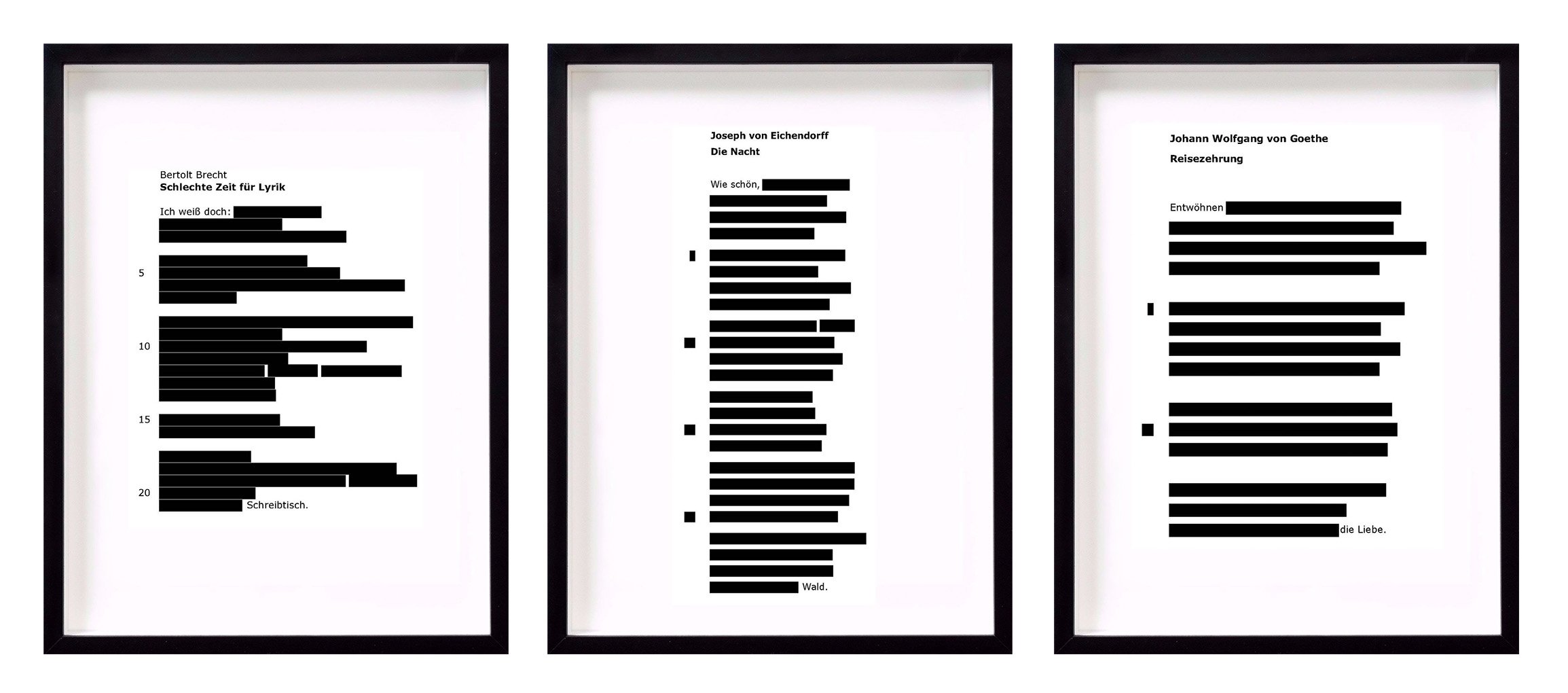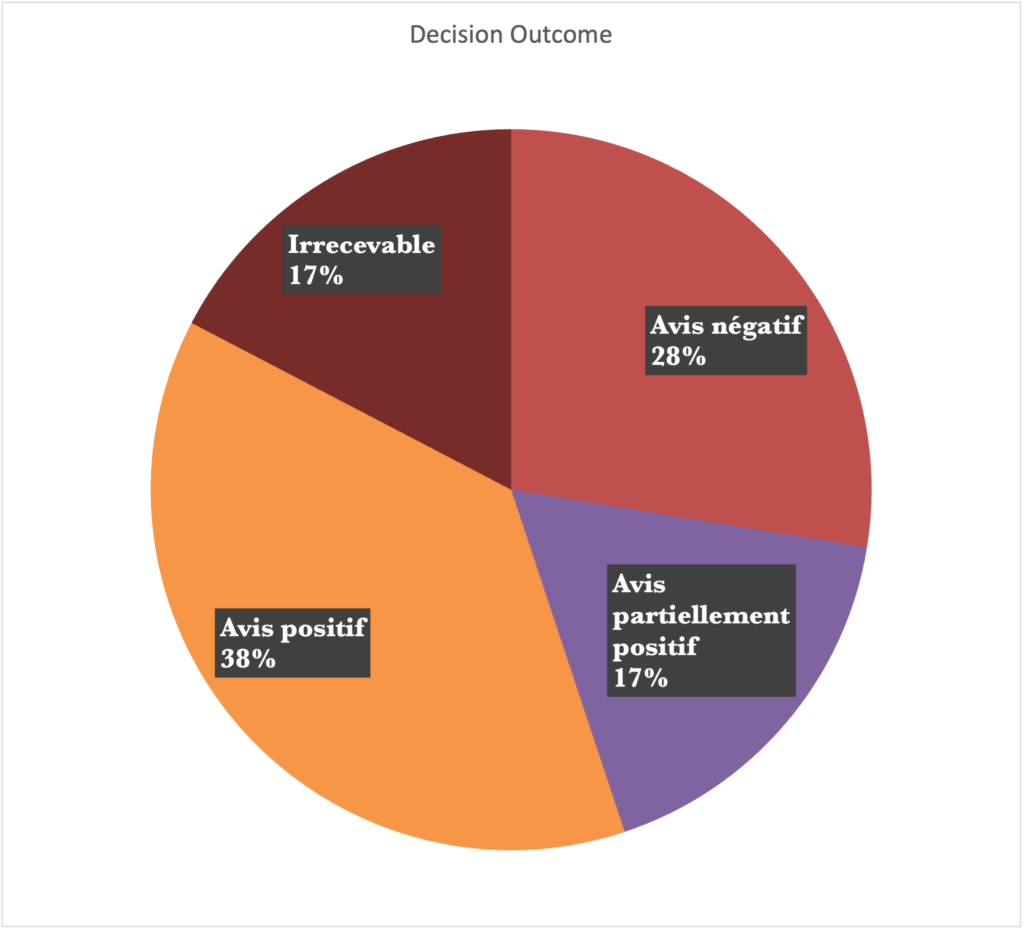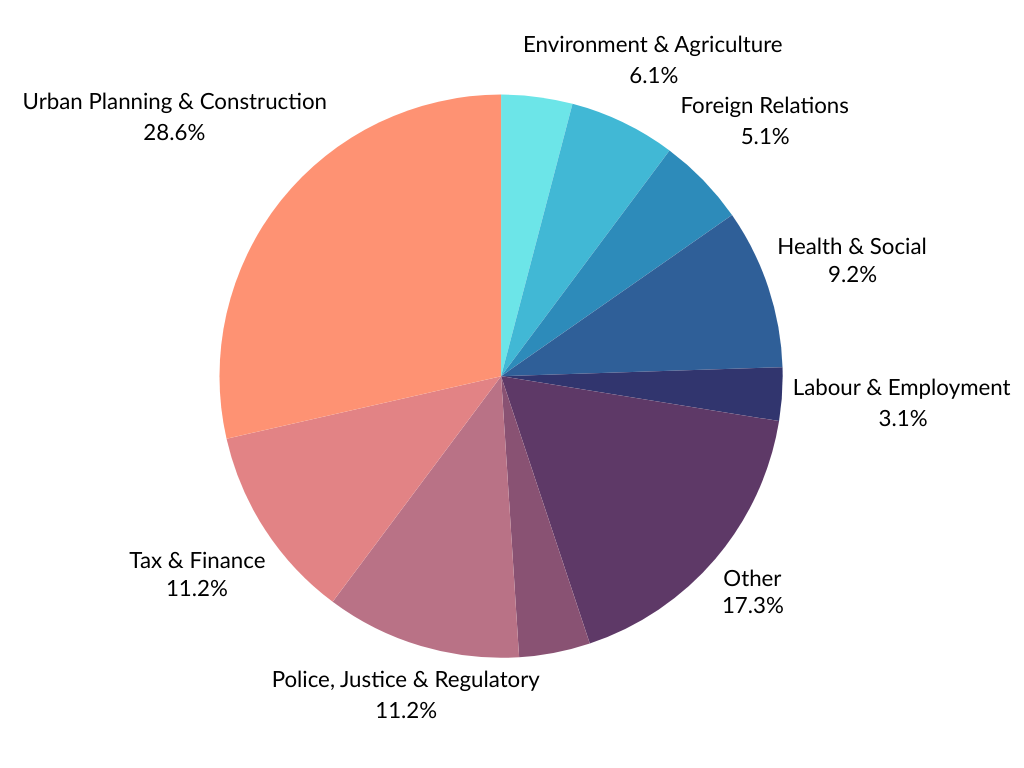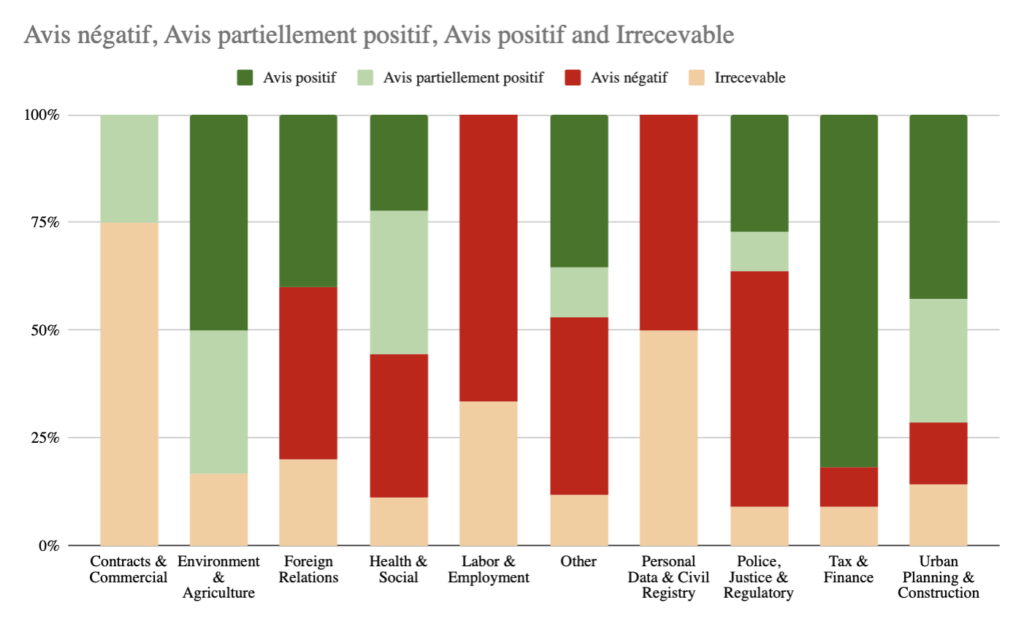Die deutsche Übersetzung lesen
Lire la traduction française
Read the english translation
Léiw*en Responsable*n von enger ONG,
Léiw*en Journalist*in,
Eise bekanntste Projet, de Safe Crossing, huet Problemer mat der Verkéiersinfrastruktur siichtbar gemaach. Nodeems d’Stad Lëtzebuerg behaapt huet, mir géinge falsch leien, hu mir hier Donnée gefrot. Dat gouf refuséiert; mir hunn dogéint geklot a gewonn. De ganzen Drama ass hei ze liesen. Dorëms geet et haut net nëmmen.
D’Transparenzgesetz (Loi du 14 septembre 2018 relative à une administration transparente et ouverte), eis national Transpositioun vun der EU-Direktiv 2013/37/UE, ass e Kär vun eiser, a vläit och ärer Aarbecht. Et seet, dass mir e Recht hunn, Dokumenter vun enger Administratioun schrëftlech ze kréien. Natierlech ginn et Ausnamen – zum Beispill fir privat Informatiounen. Et ass logesch dass esou e Gesetz existéiert, well Administratiounen déngen de Bierger*innen. Et ass gutt, dass et Aschränkunge ginn, well net all Informatioun soll ëffentlech sinn.
Mir hunn dat Gesetz genotzt, fir eise Projet zur Verbesserung vun de Foussgängeriwwergäng ze finaliséieren. Wat geschitt ass, ass erschreckend, an dierf net iwwersi ginn:
D’CAD gëtt ignoréiert
Fir dass dat Gesetz kann effektiv schaffen, a fir de Fall vun engem Sträit, gëtt et eng onofhängeg Kommissioun – d’CAD – déi dem Premierminister ënnersteet, mat Représentante vum Premier, der Justice, der CNPD, de stiedeschen Syndkater a Syvicol an dem SIP. Dës Kommissioun kann zu Fäll, wou eng Administratioun “nee” zu enger Ufro seet, geruff gi fir als Ombudsstell eng objektiv Meenung ze ginn. Dack seet d’CAD, dass eng Administratioun en Dokument verëffentleche misst.
Dass Administratiounen d’Meenung vun der CAD ignoréieren ass zwar legal an der Rei – d’CAD ass kee Geriicht – mä eng demokratesch Katastroph. D’CAD ass net besonnesch liberal, mä decidéiert streng, an huet och de Bien vun den den Administratiounen en vue. Wann mir d’CAD hunn, déi an engem Gesetz definéiert gouf wat (ënner anerem vun der Buergermeeschtesch a vu Schäffe vun der Stad Lëtzebuerg), an der Chamber gestëmmt gouf, firwat gëtt si ignoréiert?
Dat ass besonnesch kriddeleg well d’CAD déi lescht Instanz ass fir Bierger*innen, ONGen a Journalist*innen, hiert Recht ze kréien, ouni opwänneg, deier a laang Prozesser unzefänken.
En Ignoréiere vun der CAD ass e Schlag géint eis eege Gesetzer a géint all Mënsch oder Organisatioun, déi begrenzt Ressourcen hunn.
Den ëffentlechen Discours gëtt komplett verdréint
Eise Fall gouf am Gemengerot vun der Stad Lëtzebuerg diskutéiert. D’Argumenter vum Refus vun der Stad Lëtzebuerg loossen sech esou zesummefaassen:
- Wann eis Beamte mussen am Wësse schaffen, dass hiert Handelen an hier Kommunikatioun ëffentlech gëtt, da kënnen a wäerten si net schaffen
- D’Informatioune sinn eng Gefor fir d’Sécherheet
- Mir hunn d’Leit vun ZUG ni ëm hier Meenung gefrot
Des Argumenter sinn all invalid Feelschlëss. Informatioun mam Argument “Terrorgefor” ze verweigeren ass opportunistesch an onwierdeg. Ze behaapten, dass een net ka schaffen, wann et muss transparent sinn, ass net nëmme schlechte Wëlle mä e Verrot un eisem demokratesche System. Dobäi ass eng richteg Biergerbedeelegung net méiglech, wann d’Verwaltungen de Kader bestëmmen. Leider ass eise Fall net isoléiert.
Et gëtt kee Blat méi virun de Mond geholl
De Combel vun dësem Theater ass, am Resumé vun der Buergermeeschtesch, ze soen dat wann den Appel och vun eis gewonn gëtt, da
„muss et eeben och vläicht um legislative Plang da gekläert ginn”
(Lydie Polfer, Minutt 29 vun der Diskussioun iwwert den Appel)
Mir liesen dat esou, dass d’Buergermeeschtesch seet dass, wann d’Geriicht eis Recht gëtt, ebe muss d’Gesetz geännert ginn. Esou eng Ausso, besonnesch vun enger Volleksvertriederin, entsprécht net nëmmen engem Mëssverständnis vun EU-Direktiven, mä och net enger gesonder Virstellung vun eiser Demokratie. Et gëtt am ëffentlechen Discours ëmmer erëm d’Iddi dass d’Politik mécht, wat se wëllt. Dësen Discours ass dack iwwerzunn, an dack net wouer. Wann awer eng Volleksvertriederin esou ongenéiert seet, dass Gesetzer dann ebe mussen no hirem Wëlle passend gemaach ginn, dann ënnergruewt dat de Fonctionnement vun der demokratescher Gronduerdnung an d’Vertraue vum Vollek – wat och ëmmer dat ass – an d’Politik.
Boff jo, an elo?
Et ass wichteg, dass hei grad virun eiser aller Aen d’Transparenzgesetz ënner Ugrëff steet. Hei gëtt e Gesetz, wat de Bierger*innen soll déngen, a Fro gestallt vun enger DP-CSV-Stad-Regierung vun där och vill Memberen an der Chamber sëtzen.
Wann een d’Ufroen un d’CAD kuckt, gesäit een ëm wat et beim Transparenzgesetz eigentlech geet: Privat Kontrakter mat Administratiounen, Ännerunge vu PAGen, Convocatioune mat Administratiounen an esou virun. Et geet oft ëm banal Saachen, wou d’Ëffentlechkeet freet: „ass dat korrekt gelaf?“ Et geet em Saachen, déi eist alldeeglecht Liewe beaflossen, an un deenen är ONG schafft, oder iwwer déi är Publikatioun schreift. D’Transparenzgesetz ass déi stäerkste Waff vu Bierger, Journalisten an ONGe wann et drëms geet Ongerechtegkeet opzedecken, Korruptioun ze ënnerbannen, a Verwaltungen zur Rechenschaft ze zéien.
D’Transparenzgesetz ass e Scheinwerfer am Däischteren. D’Tatsaach, dass d’Geriicht eis net nëmme Recht ginn huet, mä och domat d’Muecht vun dësem Outil zementéiert huet, ass prodemokratesch a fräiheetlech. Et ass berouegend ze wëssen, dass Riichteren op der Säit vun der Demokratie stinn.
De Problem ass iwwregens kee Lëtzebuergesche Problem: Organisatiounen an alle westlechen Demokratië stelle fest, dass dës Refuse vun Informatiounen ëmmer méi dack ginn, ëmmer erëm mat änlech Taktiken. Den däitsche Journalist Arne Semsrott huet kierzlech Transparenzgesetzer als „Schönwettergesetze“ bezeechent. Et si Gesetzer déi agehale ginn, wann alles fein ass, mä déi mat Féiss getrëppelt ginn, wann et enk gëtt. Wéi dat an de Kontext vum beonrouegende Wandel vun eise westlechen Demokratië passt, erkläert sech vu selwem.
Et geet eis, dem ZUG, nach ëmmer nëmmen a just em Zebrasträifen. Mä et geet an deem Prozess em net manner, wéi e Schiet iwwert d’Verwaltungen ze leen. Dat ass net onbedéngt eist Thema; et ass vläicht äert. All Kéiers wann d’Politik probéiert, hiert Handelen a Schafen ze verschleieren, brauche mir all eis géigesäiteg Hëllef, fir ganz genee hinzekucken. Dofir hu mir dräi Uleies un Iech:
- Wann iergendwou eng Transparenzufro gestallt gëtt, Beriicht doriwwer – de Site vun der CAD publizéiert d’Ufroen déi bei si kommen
- Wann dir mat Verwaltunge schwätzt, maacht hinne kloer dass Transparenzgesetzer net dierfe beschnidde ginn
- Loosst eis géigesäiteg hëllefen. D’Zesummenaarbecht vun ONGen a Journalisten ass entscheedend, fir eng staark Kultur vun Transparenz ze fërderen
Lëtzebuerg rutscht ëmmer weider of wat Indexe vun Transparenz a Pressefräiheet ugeet. De FOIA an den USA oder d’IFG an Däitschland hu gewisen, dass Transparenz kann zur Traditioun ginn. Eist Transparenzgesetz ass nach jonk – a mir kënnen ëm hëllefen, goen ze léieren.
Wann eis dat geléngt, schafe mir domat net nëmmen eng Kultur vun der Transparenz, mä och eng vun de wichtegste Grondlagen, déi richteg Problemer vun der Zukunft wéi Demokratieerhalt, Klimawandel a Fridden ze ënnerstëtzen. An dat ass et derwäert.
Am Numm vun ZUG,
Thorben Grosser.
Traduction Française
Ce texte a été initialement traduit à l’aide d’un outil de traduction automatique, puis révisé et édité par l’auteur. Bien que des efforts aient été faits pour garantir l’exactitude et la clarté, certaines nuances ou expressions peuvent légèrement différer de la version luxembourgeoise originale.
Cher*e représentant*e d’ONG,
Cher*e journaliste,
Notre projet le plus connu, Safe Crossing, a rendu visibles les problèmes liés aux infrastructures de circulation. Après que la ville de Luxembourg a prétendu que nous avions tort, nous avons demandé ses données. Celles-ci nous ont été refusées ; nous avons contesté cette décision devant les tribunaux et nous avons gagné. Vous pouvez lire toute l’histoire ici, mais ce n’est pas notre objectif principal aujourd’hui.
La loi du 14 septembre 2018 relative à une administration transparente et ouverte, transposition nationale de la directive 2013/37/UE, est au cœur de notre travail – et peut-être du vôtre aussi. La loi garantit que les citoyens ont le droit de demander des documents écrits aux administrations. Bien sûr, il y a des exceptions – comme pour les informations privées – mais, en général, l’existence d’une telle loi est logique car les administrations sont au service des citoyens. Les limitations mises en place sont justifiées car toutes les informations ne peuvent pas ou ne doivent pas être publiques.
Nous avons utilisé cette loi pour finaliser notre projet d’amélioration des passages pour piétons. Ce qui s’est passé depuis est alarmant et ne peut être ignoré :
La CAD est ignorée
Pour que la loi fonctionne efficacement et pour résoudre les litiges, il existe une commission indépendante, la CAD (commission d’accès aux documents), placée sous l’autorité du Premier ministre. Elle est composée de représentants des services du Premier ministre, du ministère de la Justice, de la CNPD, du syndicat municipal Syvicol et du SIP. La CAD est une sorte d’ombudsman qui donne un avis objectif lorsqu’une administration rejette une demande. Souvent, la CAO décide que les administrations doivent communiquer les documents demandés.
Bien qu’il soit légalement permis aux administrations d’ignorer les avis de la CAD – la CAD n’est pas une cour de justice – il s’agit d’une catastrophe démocratique. La CAD n’est pas particulièrement indulgente, mais elle décide avec soin et tient compte des besoins des administrations. Si la CAD, organe créé par une loi (adoptée par certains membres du gouvernement de la Ville de Luxembourg) existe, pourquoi est-elle ignorée ?
C’est d’autant plus problématique que la CAD est le dernier recours accessible aux citoyens, aux ONG et aux journalistes pour faire valoir leurs droits sans s’engager dans des batailles juridiques coûteuses en temps et en argent.
Ignorer la CAD est un coup porté à notre système juridique et à toute personne ou organisation disposant de ressources limitées.
Le discours public est déformé
Notre cas a été débattu au Conseil communal de Luxembourg. Les arguments contre notre demande peuvent être résumés comme suit :
- Si nos fonctionnaires doivent travailler en sachant que leurs actions et leurs communications peuvent devenir publiques, ils ne peuvent pas et ne veulent pas travailler.
- Les informations présentent un risque pour la sécurité.
- Les personnes du ZUG n’ont jamais été invitées à donner leur avis.
Ces arguments sont tous des sophismes non valables. Rejeter des demandes sous prétexte de « risques de sécurité » est opportuniste et indigne d’un système démocratique. Prétendre que la transparence nuit à la capacité de travailler efficacement n’est pas seulement un mauvais raisonnement, mais une trahison des valeurs démocratiques. Il ne peut y avoir de véritable participation citoyenne lorsque les administrations dictent le cadre.
Malheureusement, notre cas n’est pas unique. Des tactiques similaires sont utilisées dans le monde entier.
Plus de faux-semblants
Le summum de cette absurdité a été atteint lorsque la bourgmestre de la ville de Luxembourg a déclaré au cours des débats du conseil municipal :
« Si l’appel est décidé en leur faveur, nous devrons peut-être aborder cette question sur le plan législatif. »
(Lydie Polfer, minute 29 de la discussion sur l’appel)
Nous interprétons cette déclaration comme le fait que la maire suggère que si les tribunaux se prononcent en notre faveur, la loi elle-même doit être modifiée. Une telle déclaration – surtout de la part d’une représentante élue – reflète non seulement une mauvaise compréhension des directives de l’UE, mais sape également les principes de la démocratie. S’il est souvent exagéré de dire que les hommes politiques font ce qu’ils veulent, ce genre de déclaration sans honte renforce la méfiance à l’égard de la politique et érode la confiance fondamentale des citoyens.
Ben ouais, et maintenant ?
Il est essentiel de reconnaître que la loi sur la transparence est actuellement attaquée sous nos yeux. Cette loi, censée servir le peuple, est remise en question par un gouvernement municipal DP-CSV qui comprend de nombreux membres siégeant au Parlement.
Si l’on examine les cas portés devant la CAD, on voit ce que la loi sur la transparence vise fondamentalement : contrats privés avec les administrations, changements de zonage, comptes-rendus de réunions administratives, et bien d’autres choses encore. Il s’agit souvent d’affaires banales pour lesquelles le public veut simplement savoir : « Cela a-t-il été traité correctement ? » Il s’agit de questions qui ont un impact sur notre vie quotidienne – des questions sur lesquelles votre ONG travaille ou que votre publication couvre.
La loi sur la transparence est l’outil le plus puissant dont disposent les citoyens, les journalistes et les ONG pour dénoncer les injustices, lutter contre la corruption et demander des comptes aux administrations.
La loi sur la transparence est un phare dans l’obscurité. Le fait que les tribunaux aient non seulement statué en notre faveur, mais aussi élargi le pouvoir de cet outil, est une victoire pour la démocratie et la liberté. Il est rassurant de savoir que les juges sont du côté de la démocratie.
Ce problème n’est pas propre au Luxembourg. Les organisations de toutes les démocraties occidentales observent une augmentation des refus de divulguer des informations, souvent en utilisant des tactiques similaires. Le journaliste allemand Arne Semsrott a récemment qualifié les lois sur la transparence de « lois du beau temps ». Elles sont respectées lorsque tout va bien, mais piétinées lorsque les choses se corsent. Ce que cela signifie dans le contexte des défis auxquels les démocraties occidentales sont actuellement confrontées est évident.
Au ZUG, nous nous concentrons sur les passages pour piétons. Mais cette affaire va bien plus loin : elle concerne l’ombre portée sur les administrations. Si ce n’est pas notre objectif, ce peut être le vôtre. Chaque fois que les gouvernements tentent d’obscurcir leurs actions et leurs décisions, nous devons travailler ensemble pour leur demander des comptes.
Trois demandes pour vous
- Rendre compte des demandes de transparence. Le site web de la CAD publie les demandes qu’elle reçoit – utilisez cette information pour mettre en lumière ces cas.
- Plaidez en faveur de la transparence. Lorsque vous vous adressez aux administrations, insistez sur le fait que les lois sur la transparence ne doivent pas être affaiblies.
- Collaborer avec de nombreuses personnes. La collaboration des ONG et des journalistes est essentielle pour promouvoir une forte culture de la transparence.
Le Luxembourg perd du terrain dans les classements relatifs à la transparence et à la liberté de la presse. La FOIA aux États-Unis et l’IFG en Allemagne ont montré que la transparence peut devenir une tradition. Notre loi sur la transparence est encore jeune, mais nous pouvons l’aider à se développer.
Si nous y parvenons, nous ne nous contenterons pas d’instaurer une culture de la transparence, mais nous jetterons l’une des bases les plus importantes pour relever les défis les plus pressants de l’avenir, tels que la préservation de la démocratie, la lutte contre le changement climatique et le maintien de la paix. Et cela en vaut la peine.
Au nom du ZUG,
Thorben Grosser
Deutsche Fassung
Dieser Text wurde ursprünglich mit einem maschinellen Übersetzungstool übersetzt und anschließend vom Autor überprüft und bearbeitet. Es wurde darauf geachtet, Genauigkeit und Klarheit zu gewährleisten. Dennoch können Nuancen oder Ausdrücke vorhanden sein, die leicht vom ursprünglichen luxemburgischen Text abweichen.
Sehr geehrte*r Vertreter*in von einer NGO,
sehr geehrte*r Journalist*in,
unser bekanntestes Projekt, „Safe Crossing“, hat Probleme mit der Verkehrsinfrastruktur sichtbar gemacht. Nachdem die Stadt Luxemburg behauptete, wir lägen falsch, haben wir um ihre Daten gebeten. Dies wurde abgelehnt; wir haben es vor Gericht angefochten und gewonnen. Sie können das gesamte Drama hier nachlesen, aber das ist heute nicht unser Hauptanliegen.
Das Transparenzgesetz (Loi du 14 septembre 2018 relative à une administration transparente et ouverte), Luxemburgs nationale Umsetzung der EU-Richtlinie 2013/37/UE, ist für unsere Arbeit von zentraler Bedeutung – und vielleicht auch für Ihre. Das Gesetz garantiert, dass Bürger das Recht haben, schriftliche Dokumente von Behörden anzufordern. Natürlich gibt es Ausnahmen – beispielsweise für private Informationen –, aber im Allgemeinen ist ein solches Gesetz sinnvoll, da Behörden den Menschen dienen. Die bestehenden Einschränkungen sind gerechtfertigt, da nicht alle Informationen öffentlich sein können oder sollten.
Wir haben dieses Gesetz genutzt, um zu probieren, unser Projekt zur Verbesserung von Fußgängerüberwegen abzuschließen. Was seitdem passiert ist, ist alarmierend und kann nicht ignoriert werden:
Der CAD wird ignoriert
Damit das Gesetz effektiv funktioniert und Streitigkeiten beigelegt werden können, gibt es eine unabhängige Kommission – die CAD – die dem Premierminister unterstellt ist. Ihr gehören Vertreter des Büros des Premierministers, des Justizministeriums, der CNPD, des kommunalen Syndikats Syvicol und des SIP an. Die CAD fungiert als eine Art Ombudsmann und gibt eine objektive Stellungnahme ab, wenn eine Verwaltung einen Antrag ablehnt. Häufig entscheidet die CAD, dass die Verwaltungen die angeforderten Dokumente freigeben sollten.
Obwohl es rechtlich zulässig ist, dass Verwaltungen die Stellungnahmen der CAD ignorieren – die CAD ist kein Gericht –, ist dies eine demokratische Katastrophe. Die CAD ist nicht besonders nachsichtig, sondern entscheidet sorgfältig und berücksichtigt die Bedürfnisse der Verwaltungen. Wenn die CAD, eine gesetzlich geschaffene Einrichtung (die von einigen Mitgliedern der Regierung der Stadt Luxemburg verabschiedet wurde), existiert, warum wird sie dann ignoriert?
Dies ist besonders problematisch, da der CAD für Bürger*innen, NGOs und Journalist*innen die letzte Möglichkeit ist, ihre Rechte geltend zu machen, ohne kostspielige und zeitaufwändige Rechtsstreitigkeiten führen zu müssen.
Die Missachtung des CAD ist ein Schlag gegen unser Rechtssystem und gegen jede Person oder Organisation mit begrenzten Ressourcen.
Der öffentliche Diskurs wird verdreht
Unser Fall wurde im Stadtrat von Luxemburg diskutiert. Die Argumente gegen unseren Antrag lassen sich wie folgt zusammenfassen:
- Wenn unsere Beamten in dem Wissen arbeiten müssen, dass ihre Handlungen und Mitteilungen öffentlich werden könnten, können und werden sie nicht arbeiten.
- Die Informationen stellen ein Sicherheitsrisiko dar.
- Die Mitarbeiter der ZUG wurden nie um ihre Meinung gebeten.
Diese Argumente sind allesamt ungültige Trugschlüsse. Die Ablehnung von Anträgen unter dem Vorwand von „Sicherheitsrisiken“ ist opportunistisch und eines demokratischen Systems unwürdig. Die Behauptung, dass Transparenz die Fähigkeit zu effektivem Arbeiten untergräbt, ist nicht nur eine schlechte Argumentation, sondern ein Verrat an demokratischen Werten. Echte Bürgerbeteiligung kann nicht stattfinden, wenn Verwaltungen den Rahmen vorgeben.
Leider sind wir kein Einzelfall. Weltweit werden ähnliche Taktiken angewandt.
Keine Scham mehr
Der Gipfel dieser Absurdität war, als die Bürgermeisterin der Stadt Luxemburg während der Ratsdiskussionen erklärte:
„Wenn der Einspruch zu ihren Gunsten entschieden wird, müssen wir uns möglicherweise mit diesem Thema auf gesetzgeberischer Ebene befassen.“
(Lydie Polfer, Minute 29 der Einspruchsdebatte)
Wir interpretieren dies so, dass die Bürgermeisterin vorschlägt, das Gesetz selbst zu ändern, falls die Gerichte zu unseren Gunsten entscheiden. Eine solche Aussage – insbesondere von einem gewählten Vertreter – zeugt nicht nur von einem Missverständnis der EU-Richtlinien, sondern untergräbt auch die Grundsätze der Demokratie. Zwar wird oft übertrieben dargestellt, dass Politiker tun und lassen können, was sie wollen, doch diese Art von unverschämter Erklärung verstärkt das Misstrauen gegenüber der Politik und untergräbt das grundlegende Vertrauen der Bevölkerung.
Ja gut, und was nun?
Es ist wichtig zu erkennen, dass das Transparenzgesetz derzeit vor unseren Augen angegriffen wird. Dieses Gesetz, das den Menschen dienen soll, wird von einer DP-CSV-Stadtregierung in Frage gestellt, der viele Mitglieder angehören, die im Parlament sitzen.
Wenn Sie sich die Fälle ansehen, die vor der CAD verhandelt wurden, versteht man, worum es beim Transparenzgesetz im Grunde geht: private Verträge mit Verwaltungen, Änderungen der Flächennutzungsplanung, Protokolle von Verwaltungsbesprechungen und vieles mehr. Dabei handelt es sich oft um alltägliche Angelegenheiten, bei denen die Öffentlichkeit einfach wissen möchte: „Wurde das korrekt gehandhabt?“ Es geht um Themen, die unser tägliches Leben beeinflussen – Themen, mit denen sich Ihre NGO befasst oder die in Ihrer Publikation behandelt werden.
Das Transparenzgesetz ist das stärkste Instrument, das Bürgern, Journalisten und NGOs zur Verfügung steht, um Ungerechtigkeiten aufzudecken, Korruption zu bekämpfen und Verwaltungen zur Rechenschaft zu ziehen.
Das Transparenzgesetz ist ein Scheinwerfer in der Dunkelheit. Die Tatsache, dass die Gerichte nicht nur zu unseren Gunsten entschieden, sondern auch die Macht dieses Instruments erweitert haben, ist ein Sieg für Demokratie und Freiheit. Es ist beruhigend zu wissen, dass Richter auf der Seite der Demokratie stehen.
Dieses Problem ist nicht nur in Luxemburg zu beobachten. Organisationen in allen westlichen Demokratien beobachten eine Zunahme von Verweigerungen der Informationsfreigabe, wobei oft ähnliche Taktiken angewandt werden. Der deutsche Journalist Arne Semsrott bezeichnete kürzlich Transparenzgesetze als „Schönwettergesetze“. Sie werden respektiert, wenn alles in Ordnung ist, aber mit Füßen getreten, wenn es schwierig wird. Wie das in den Kontext des beunruigenden Wandels aktueller westlicher Demokratien passt, ist selbstredend.
Bei ZUG liegt unser Fokus weiterhin auf Fußgängerüberwegen. Aber in diesem Fall geht es um viel mehr – es geht um den Schatten, der auf die Verwaltungen geworfen wird. Das mag nicht unser Fokus sein, aber vielleicht ist es Ihrer. Wann immer Regierungen versuchen, ihre Handlungen und Entscheidungen zu verschleiern, müssen wir zusammenarbeiten, um sie zur Rechenschaft zu ziehen. Drei Bitten an Sie:
- Berichten Sie über Transparenzanfragen. Die Website des CAD veröffentlicht die eingegangenen Anfragen – nutzen Sie diese Informationen, um Licht in diese Fälle zu bringen.
- Setzen Sie sich für Transparenz ein. Wenn Sie mit Behörden sprechen, betonen Sie, dass Transparenzgesetze nicht untergraben werden dürfen.
- Arbeiten Sie mit vielen zusammen. Die Zusammenarbeit von NGOs und Journalisten ist entscheidend für die Förderung einer starken Kultur der Transparenz.
Luxemburg rutscht in den Rankings zu Transparenz und Pressefreiheit immer weiter ab. FOIA in den USA und IFG in Deutschland haben gezeigt, dass Transparenz zur Tradition werden kann. Unser Transparenzgesetz ist noch jung – aber wir können ihm beim Wachsen helfen.
Wenn wir erfolgreich sind, schaffen wir nicht nur eine Kultur der Transparenz, sondern legen auch eine der wichtigsten Grundlagen für die Bewältigung der dringendsten Herausforderungen der Zukunft, wie die Bewahrung der Demokratie, die Bekämpfung des Klimawandels und die Sicherung des Friedens. Und das ist es wert.
Im Namen von ZUG,
Thorben Grosser
English Translation
This text was initially translated using a machine translation tool and subsequently reviewed and edited by the author. While care has been taken to ensure accuracy and clarity, there may still be nuances or expressions that differ slightly from the original Luxembourgish version.
Dear NGO Representatives,
Dear Journalist,
Our most well-known project, Safe Crossing, has made issues with traffic infrastructure visible. After the City of Luxembourg claimed we were wrong, we asked for their data. This was refused; we challenged it in court and won. You can read the entire drama here, but that is not our primary focus today.
The Transparency Law (Loi du 14 septembre 2018 relative à une administration transparente et ouverte), Luxembourg’s national transposition of EU Directive 2013/37/UE, is central to our work—and perhaps to yours as well. The law guarantees that citizens have the right to request written documents from administrations. Of course, there are exceptions—such as for private information—but, in general, the existence of such a law makes sense because administrations serve the people. The limitations in place are justified since not all information can or should be public.
We used this law to finalize our project to improve pedestrian crossings. What has happened since is alarming and cannot be ignored:
The CAD Is Being Ignored
For the law to work effectively, and to resolve disputes, there is an independent commission—the CAD—under the authority of the Prime Minister. It includes representatives from the Prime Minister’s office, Justice Ministry, CNPD, the municipal syndicate Syvicol, and the SIP. The CAD serves as a kind of ombudsman, offering an objective opinion when an administration denies a request. Often, the CAD determines that administrations should release the requested documents.
While it is legally permissible for administrations to ignore the CAD’s opinions—the CAD is not a court of justice—this is a democratic catastrophe. The CAD is not particularly lenient but decides with care and considers the needs of administrations. If the CAD, a body created under a law (which was passed by some members of the Luxembourg City government) is exists, why is it ignored?
This is especially problematic because the CAD is the last accessible resort for citizens, NGOs, and journalists to assert their rights without embarking on costly and time-consuming legal battles.
Ignoring the CAD is a blow to our legal system and to every person or organization with limited resources.
The Public Discourse Is Being Twisted
Our case was debated in the Luxembourg City Council. The arguments against our request can be summarized as follows:
- If our civil servants have to work knowing that their actions and communications might become public, they cannot and will not work.
- The information poses a security risk.
- The people at ZUG were never asked for their opinion.
These arguments are all invalid fallacies. Rejecting requests under the guise of “security risks” is opportunistic and unworthy of a democratic system. Claiming that transparency undermines the ability to work effectively is not just poor reasoning but a betrayal of democratic values. True citizen participation cannot happen when administrations dictate the framework.
Unfortunately, our case is not unique. Similar tactics are being used worldwide.
No Pretense Anymore
The pinnacle of this absurdity was when Luxembourg City’s mayor stated during council discussions:
“If the appeal is decided in their favor, we may need to address this legislatively.”
(Lydie Polfer, minute 29 of the appeal discussion)
We interpret this as the mayor suggesting that if the courts rule in our favor, the law itself must be changed. Such a statement—especially from an elected representative—not only reflects a misunderstanding of EU directives but also undermines the principles of democracy. While it is often exaggerated that politicians do whatever they want, this kind of unashamed declaration reinforces distrust in politics and erodes the foundational trust of the people.
So, What Now?
It is crucial to acknowledge that the transparency law is currently under attack before our very eyes. This law, meant to serve the people, is being challenged by a DP-CSV city government that includes many members who sit in Parliament.
If you examine the cases brought to the CAD, you’ll see what the transparency law is fundamentally about: private contracts with administrations, zoning changes, administrative meeting minutes, and more. These are often mundane matters where the public simply wants to know: “Was this handled correctly?” They concern issues that impact our daily lives—issues that your NGO works on or that your publication covers.
The transparency law is the strongest tool available to citizens, journalists, and NGOs to expose injustices, combat corruption, and hold administrations accountable.
The transparency law is a spotlight in the dark. The fact that the courts not only ruled in our favor but also expanded the power of this tool is a victory for democracy and freedom. It’s reassuring to know that judges stand on the side of democracy.
This issue is not unique to Luxembourg. Organizations in all Western democracies are observing an increase in refusals to release information, often using similar tactics. The German journalist Arne Semsrott recently called transparency laws “fair-weather laws.” They are respected when everything is fine but trampled on when things get tough. What that means in the context of the challenges western democracies face right now is self-explanatory.
At ZUG, our focus remains on pedestrian crossings. But this case is about much more—it’s about the shadow being cast over administrations. While that may not be our focus, it might be yours. Whenever governments attempt to obscure their actions and decisions, we need to work together to hold them accountable.
Three Requests for You
- Report on transparency requests. The CAD’s website publishes the requests it receives—use this information to shine a light on these cases.
- Advocate for transparency. When speaking to administrations, emphasize that transparency laws must not be undermined.
- Collaborate with many. The collaboration of NGOs and journalists is crucial to fostering a strong culture of transparency.
Luxembourg is slipping further in transparency and press freedom rankings. FOIA in the U.S. and IFG in Germany have shown that transparency can become tradition. Our transparency law is still young—but we can help it grow.
If we succeed, we won’t just build a culture of transparency but also lay one of the most critical foundations for addressing the most pressing future challenges like preserving democracy, combating climate change, and ensuring peace. And that is worth it.
On behalf of ZUG,
Thorben Grosser
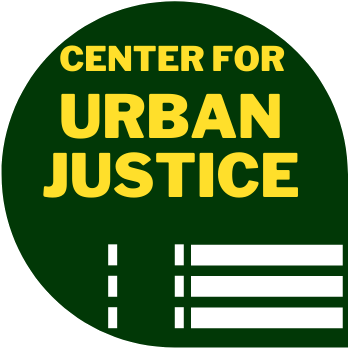
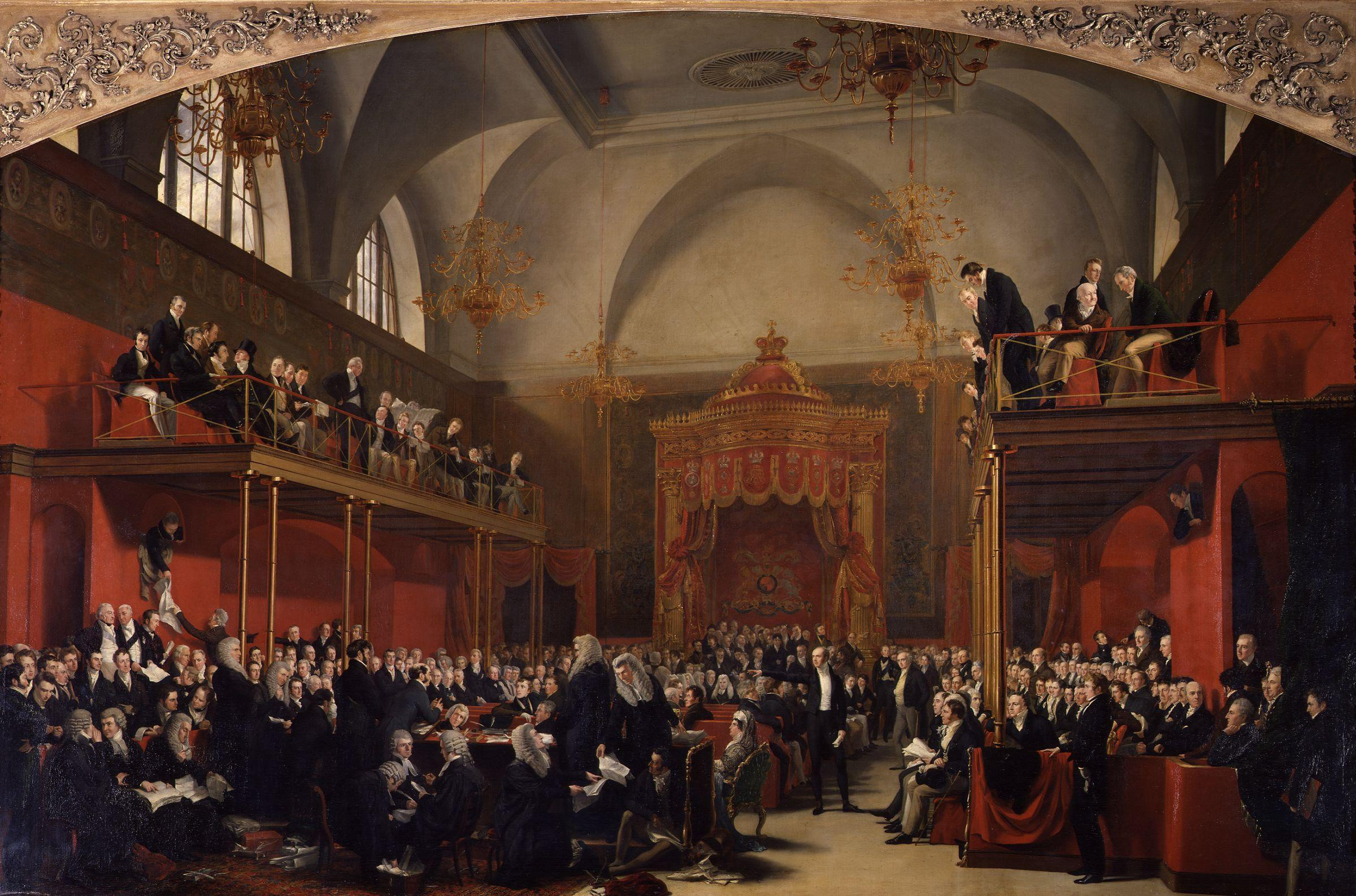

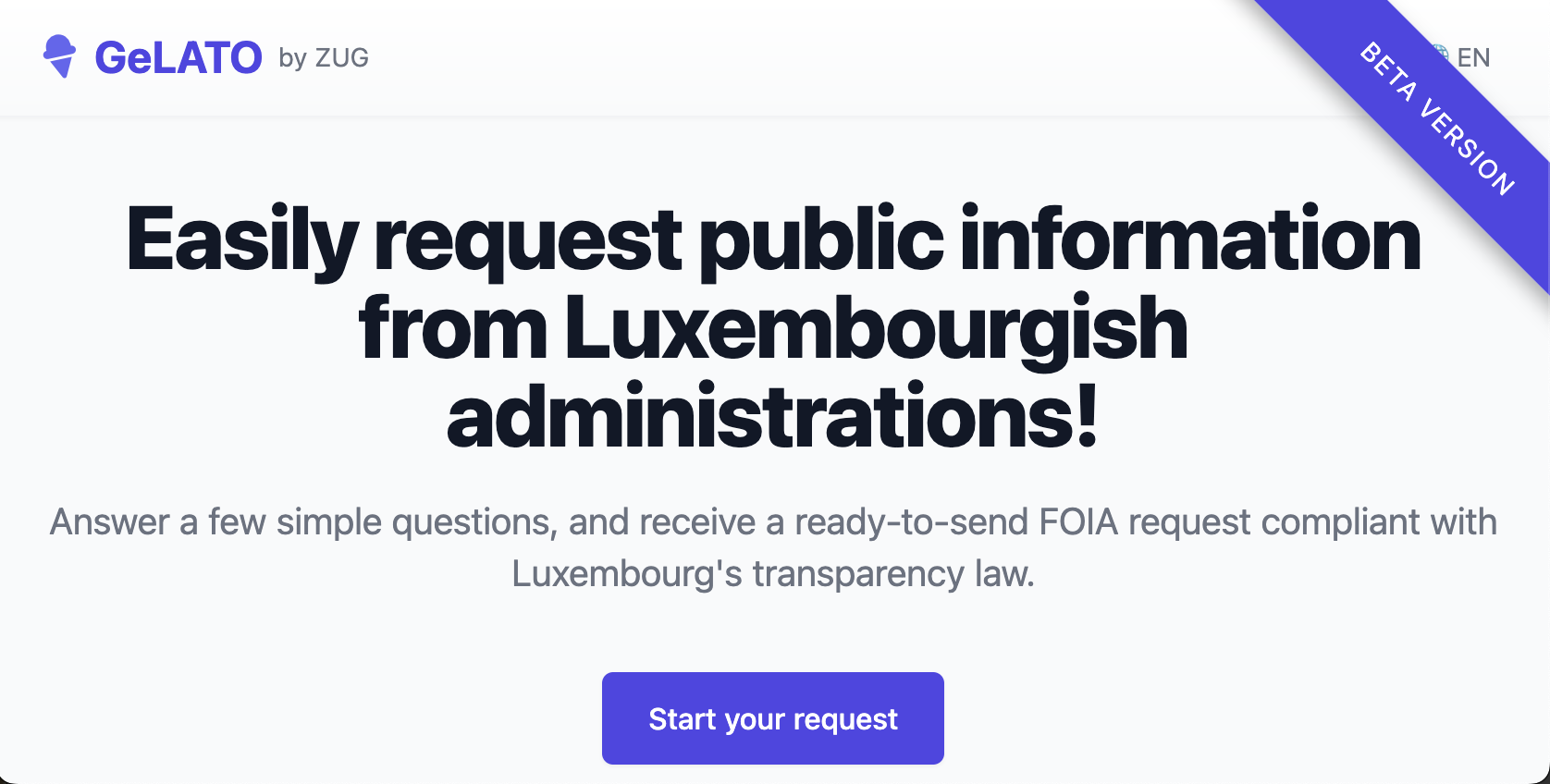
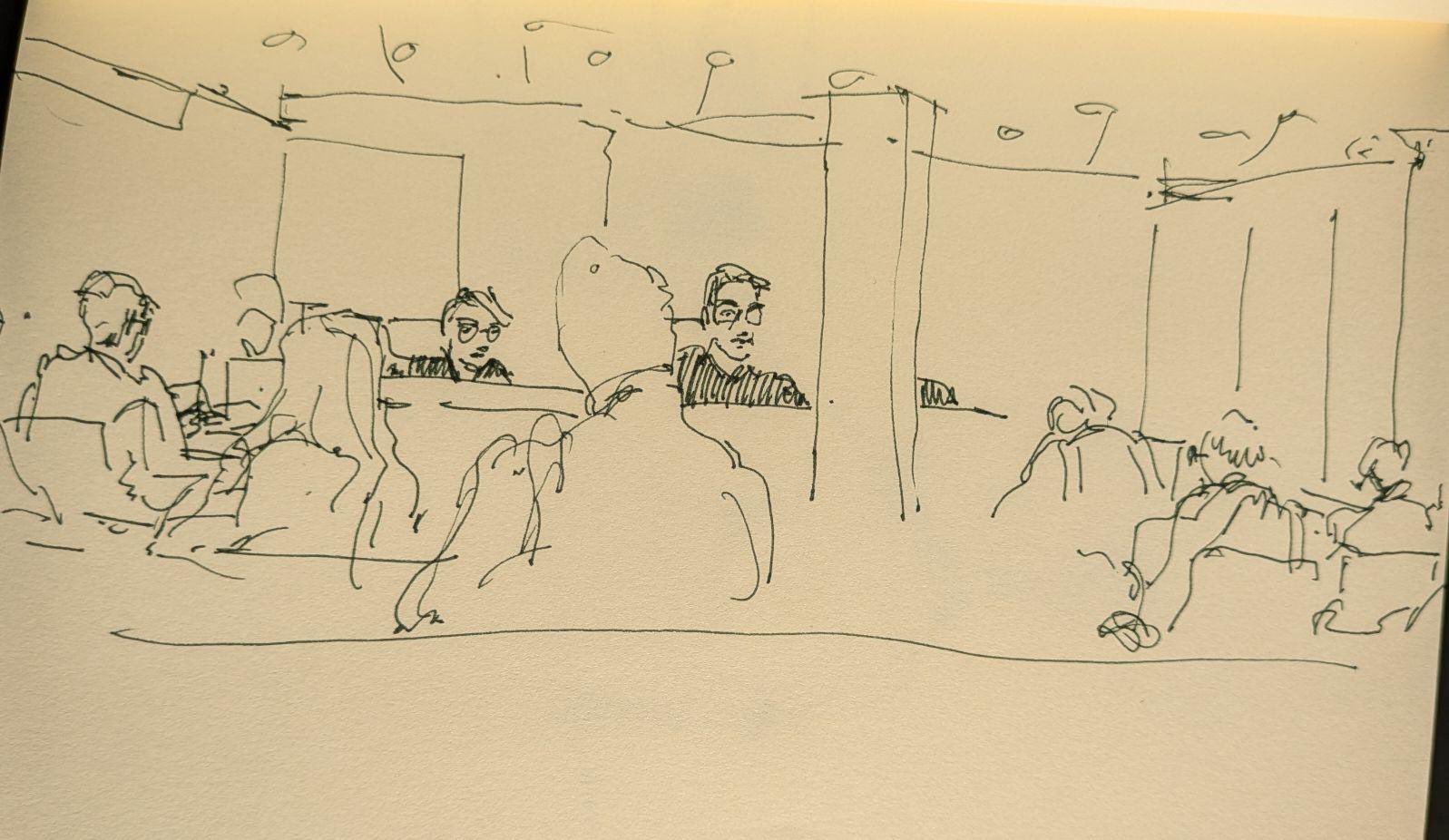
![[Press Release] ZUG Enters Final Legal Round for Pedestrian Safety and Freedom of Information](https://zug.lu/wp-content/uploads/sites/3/2025/03/People-waiting-to-cross-outside-Luxembourgs-central-train-station-in-July-scaled.jpg)
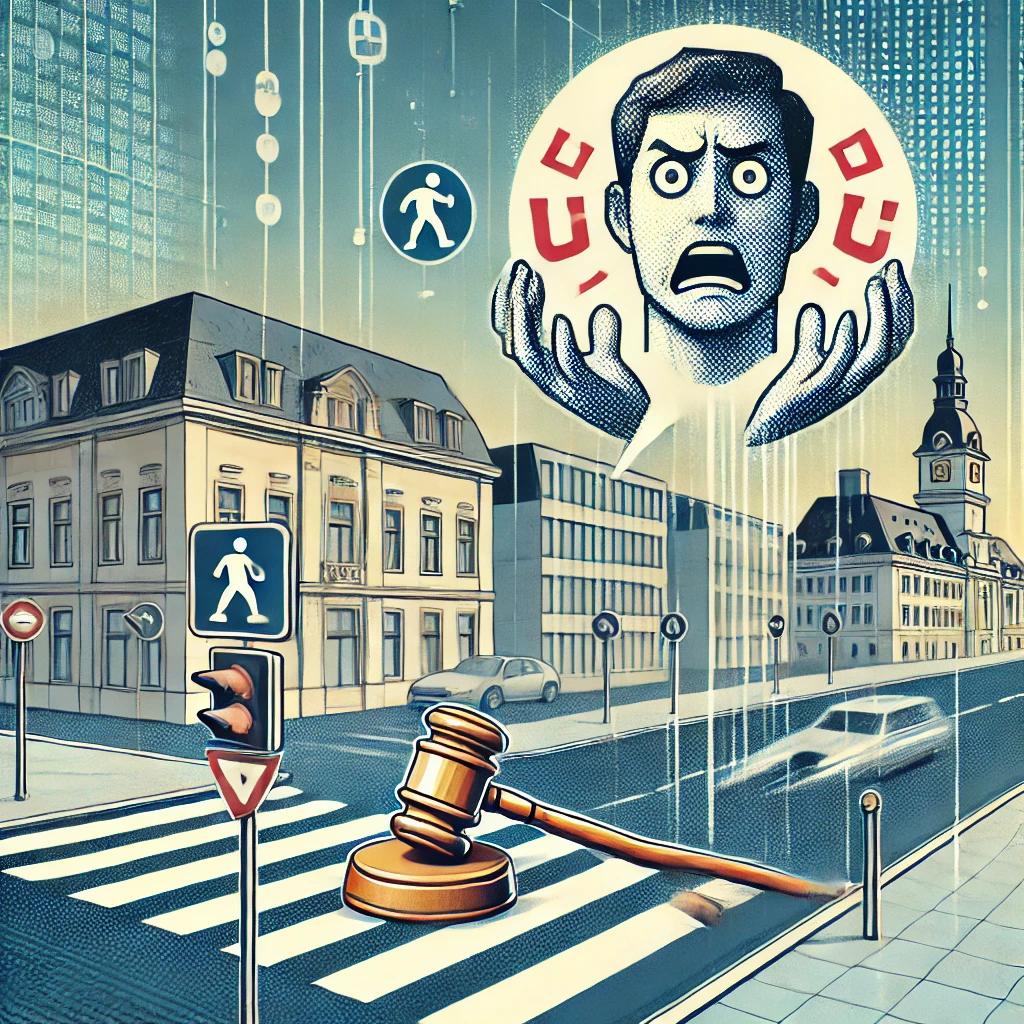

![[Oppene Bréif] ONGen an Journalist*innen – dräi Uleies un Iech fir méi ëffentlech Transparenz](https://zug.lu/wp-content/uploads/sites/3/2025/01/Untitled-design.png)
